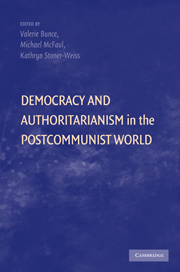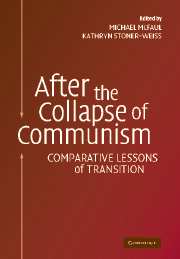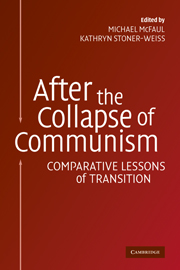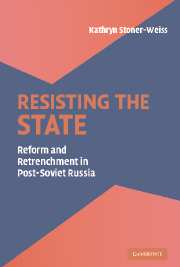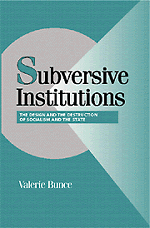Democracy and Authoritarianism in the Postcommunist World
This volume brings together a distinguished group of scholars working on Eastern Europe and the former Soviet Union to examine in depth three waves of democratic change that took place in eleven different former Communist nations. Its essays draw important conclusions about the rise, development, and breakdown of both democracy and dictatorship in each country and together provide a rich comparative perspective on the post-Communist world. The first democratic wave to sweep this region encompasses the rapid rise of democratic regimes from 1989 to 1992 from the ashes of Communism and Communist states. The second wave arose with accession to the European Union (from 2004 to 2007) and the third, with the electoral defeat of dictators (1996 to 2005) in Croatia, Serbia, Georgia, and Ukraine. Although these three waves took place in different countries and involved different strategies, they nonetheless shared several overarching commonalities. International factors played a role in all three waves, as did citizens demanding political change. Further, each wave revealed not just victorious democrats but also highly resourceful authoritarians. The authors of each chapter in this volume examine both internal and external dimensions of both democratic success and failure.
- Contains a unique group of country cases, with each chapter presenting new empirical data and analysis
- Tightly organized around the causes of transitional successes and failures
- Both North American and in-country experts are included in the distinguished list of authors
Reviews & endorsements
“Democracy and Authoritarianism in the Postcommunist World surveys the waves of democratizing movements across the postcommunist region subsequent to the 1989–92 period to raise critical questions about the sources of regime change, among them popular protest and mobilization, opposition cohesiveness, the diffusion of organizational tactics, and the influence of external actors. The book considers both blocked and successful democratization movements. Several of the chapters are likely to stand as authoritative analyses of the outcomes of the electoral revolutions in particular countries. This is a significant volume of broad ambition.”
– Thomas F. Remington, Goodrich C. White Professor of Political Science, Emory University
“Necessary reading for all who seek to understand what has happened to democracy in the 29 postcommunist states, these exceptional essays by leading experts balance nuanced interpretations of the particularities of individual regimes with comparative insights that speak to all students of regime dynamics – particularly on the complexity, diversity, and instability of mixed or hybrid regimes and the decisive role that local democrats or authoritarians can play when they can draw on the resources offered by regional and global allies.”
– Philip G. Roeder, University of California, San Diego
Product details
November 2009Paperback
9780521133081
360 pages
235 × 155 × 19 mm
0.54kg
3 b/w illus. 8 tables
Available
Table of Contents
- Prologue Valerie Bunce, Michael McFaul and Kathryn Stoner-Weiss
- Part I. Waves of Regime Change: From Dictatorship to Democracy … and Back?:
- 1. The missing variable: the 'international system' as the link between third and fourth wave models of democratization Michael McFaul
- 2. A regional tradition: the diffusion of democratic change under communism and post-communism Valerie Bunce and Sharon Wolchick
- Part II. Encouraging Democracy: The Role of the EU:
- 3. When Europeanization meets transformation: lessons from the unfinished East European revolutions Alina Pippidi
- 4. Democratization in post-communist Europe: illiberal regimes and the leverage of the European Union Milada Vachudova
- Part III. Choosing Regime Change: Democratizing Elections:
- 5. A post-communist transition in two acts: the 1996–97 antigovernment struggle in Bulgaria as a bridge between the 1989–92 and 1996–2007 democratization waves in Eastern Europe Tsveta Petrova
- 6. Defining and domesticating the electoral model: a comparison of Slovakia and Serbia Valerie Bunce and Sharon Wolchik
- 7. Georgia's rose revolution: from regime weakness to regime collapse Cory Welt
- 8. Importing revolution: internal and external factors in Ukraine's 2004 democratic breakthrough Michael McFaul
- Part IV. Resisting Reform: Backsliding Democracies and Enduring Autocracies:
- 9. Resistance to contagion: sources of authoritarian stability in the former Soviet Union Lucan Way
- 10. Comparing oranges and apples: the internal and external dimensions of Russia's turn away from democracy Kathryn Stoner-Weiss
- 11. Contagion deterred: preemptive authoritarianism in the former Soviet Union (the case of Belarus) Vitali Silitski
- 12. A horse of a different color: revolution and regression and Kyrgyzstan Scott Radnitz
- Epilogue: the changing character of the global struggle for democracy Valerie Bunce, Michael McFaul and Kathryn Stoner-Weiss.

